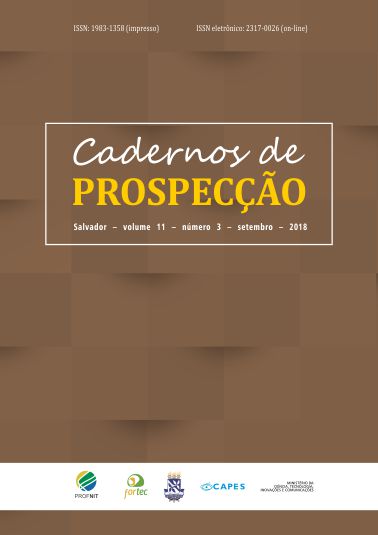Evaluation of the Innovative Capacity on the Brazilian Patentary Optical of the Use of Biotechnologies in the Textile Industry
DOI:
https://doi.org/10.9771/cp.v11i3.27009Keywords:
Textile, Biotechnology, Patent Documents, Technological Mapping, Innovation.Abstract
The textile industry has sought to innovate in its products and processes, such as the use of biotechnology – among them, enzymatic treatment, biological treatment and other treatments (for example bioblasting), highlighting the enzymatic treatment with amylases, cellulases, catalases, peroxidases and pectinase. In order to evaluate the innovative capacity of the technologies involved in this scenario, the data of the patent documents extracted from the INPI-BR database were used, where 39 patent documents were related, 38 of them related to biotechnology in the textile industry deposited by 2013, of which 24 were enzymatic treatment, 4 on biological treatment and 10 on other treatments. The time evolution showed a peak between 1996 and 2000 (except 1999). It was found that the patent documents that had their family originated in the USPTO office had more relevance in the patent deposits with focus on enzymatic treatment, other treatments and biological treatment.
Downloads
References
BUZZANGA, J. Using Technology intelligence for R&D. 3 set. 2008. Disponível em: <http://www.industryweek.com/articles/using_technology_intelligence_for_rd_17162.aspx>. Acesso em: 2 jul. 2012.
COMUNICAÇÃO LATIN AMERICA. Enzimas na produção têxtil. 28 julho 2016. Disponível em: <http://www.bioblog.com.br/enzimas-na-producao-textil/>. Acesso em: 11 jun. 2018.
DÍAZ, A. P. et al. Bioquímica. 2. ed. México: Limusa Noriega Editores, 2004.
FERRANTE, E. Biotecnologia Aplicada à Indústria Têxtil. 28 mar. 2011. Disponível em: <https://textileindustry.ning.com/m/blogpost?id=2370240%3ABlogPost%3A23891>. Acesso em: 11 jun. 2018.
GASPARIN, M. Feira têxtil mostrará aplicações biotecnológicas na indústria. 10 ago. 2010. Disponível em: <http://miriangasparin.com.br/2010/08/feira-textil-mostrara-aplicacoes-biotecnologicas-na-industria/>. Acesso em: 11 jun. 2018.
INSTITUTO NACIONAL DE PROPRIEDADE INDUSTRIAL (INPI). 2018. Disponível em: <http://www.inpi.gov.br>. Acesso em: 11 jun. 2018.
MONTEIRO, L. Bioinovação na indústria têxtil resulta em redução de custos. Correio Braziliense, Brasília, DF, Seção: Ciência e Saúde, 15 de setembro de 2010. Disponível em: <https://www.correiobraziliense.com.br/app/noticia/ciencia-e-saude/2010/09/15/interna_ciencia_saude,213050/bioinovacao-na-industria-textil-resulta-em-reducao-de-custos.shtml>. Acesso em: 11 jun. 2018.
SARAIVA, L. R. Biotecnologia Aplicada à Indústria Têxtil – Parte 1. 23 fev. 2010. Disponível em: <http://confeccaoemoda.blogspot.com/2010/02/biotecnologia-aplicada-industria-textil.html?m=1>. Acesso em: 11 jun. 2018.
WORLD INTELLECTUAL PROPERTY ORGANIZATION (WIPO). 2018. Disponível em: <http://www.wipo.int>. Acesso em: 11 jun. 2018.
Downloads
Published
How to Cite
Issue
Section
License
Copyright (c) 2018 Cadernos de Prospecção

This work is licensed under a Creative Commons Attribution-NonCommercial 4.0 International License.
O autor declara que: - Todos os autores foram nomeados. - Está submetendo o manuscrito com o consentimento dos outros autores. - Caso o trabalho submetido tiver sido contratado por algum empregador, tem o consentimento do referido empregador. - Os autores estão cientes de que é condição de publicação que os manuscritos submetidos a esta revista não tenham sido publicados anteriormente e não sejam submetidos ou publicados simultaneamente em outro periódico sem prévia autorização do Conselho Editorial. - Os autores concordam que o seu artigo ou parte dele possa ser distribuído e/ou reproduzido por qualquer forma, incluindo traduções, desde que sejam citados de modo completo esta revista e os autores do manuscrito. - Revista Cadernos de Prospecção está licenciado com uma Licença Creative Commons Attribution 4.0. Esta licença permite que outros remixem, adaptem e criem a partir do seu trabalho para fins não comerciais, e embora os novos trabalhos tenham de lhe atribuir o devido crédito e não possam ser usados para fins comerciais, os usuários não têm de licenciar esses trabalhos derivados sob os mesmos termos.
Este obra está licenciado com uma Licença Creative Commons Atribuição 4.0 Internacional.





